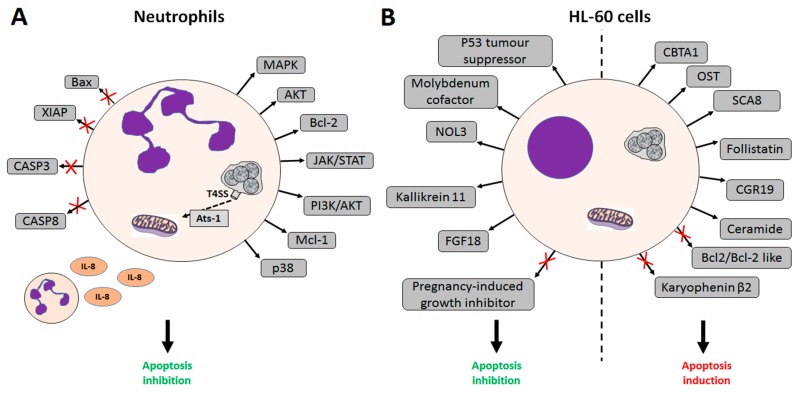Figure 1.
Effects of A. phagocytophilum infection on apoptosis pathways in human cells. (A) Effects of A. phagocytophilum infection on apoptosis in human neutrophils. A. phagocytophilum secretes the bacterial Type IV secretion system (T4SS) substrate Ats-1 that reaches the mitochondria, inhibiting cytochrome c release, inhibits Bax translocation into the mitochondria, and induces the expression of anti-apoptotic factors. Granulocyte macrophage colony-stimulating factor (GM-CSF)/cytokine stimulation of neutrophils results in activation of the Janus kinase/signal transducers and activators of transcription (JAK/STAT) pathway, resulting in the increase of Mcl-1protein levels and bacterial viability. The bcl-2 gene is activated, X-linked inhibitor of apoptosis protein (XIAP) degradation induced, and caspase-3 activation blocked. phosphoinositide kinase-3/protein kinase B (PI3K/AKT) kinases and IL-8 secretion are activated, stimulating the recruitment of neutrophils; (B) Effects of A. phagocytophilum infection on apoptosis in HL-60 cells. Factors with anti-apoptotic effect up-regulated in infected cells include genes coding for P53 tumour suppressor mutant gene, molybdenum cofactor sulphurase, nucleolar protein 3 (NOL3), kallikrein 11, and fibroblast growth factor 18 (FGF18). The pregnancy-induced growth inhibitor is down-regulated in infected cells. The pro-apoptotic effect in infected cells is supported by up-regulation of the calmodulin-binding transcription activator 1 (CBTA-1), the heparan sulphate (glucosamine) OST, the human spinocerebellar ataxia type 8 (SCA8), follistatin, the cell growth regulator 19 (CGR19), and ceramide. The karyopherin (importin) beta 2 and the anti-apoptotic factors Bcl-2 and Bcl-2-like proteins are down-regulated in infected cells.

